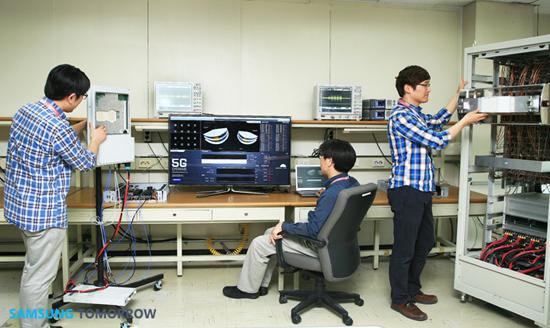
Many carriers are currently in the process of improving their 3G coverage and rolling out 4G networks, but Samsung is getting prepared for the next generation of cellular connectivity. The company today announced on its Samsung Tomorrow blog that it's developed an "adaptive array transceiver technology" that uses millimeter-wave bands to transmit cellular communications. The tech will allow for data transmissions that are hundreds of times faster than existing 4G service, Samsung says.
In its testing, Samsung was able to use its adaptive array transceiver tech to transmit data over the millimeter-wave band at the 28GHz frequency, achieving a speed of 1.056Gbps at a distance of 2 kilometers (1.24 miles). The millimeter-wave band has been thought of as a poor option for transmitting data over long distances, but Samsung explains that it managed to make its adaptive array transceiver tech a realistic option by using a total of 64 antenna elements. Samsung says that it will accelerate its development of technology for 5G networks, with plans to commercialize the tech by 2020.
Today's 4G LTE networks are capable of offering some impressive speeds, but as smartphone adoption continues to increase and consumers' hunger for content (which is also getting larger in size) grows with it, the need for newer and speedier network technology will be felt. That's why companies like Samsung and other entities are already preparing faster wireless tech. While a consumer 5G launch is still pretty far off, starting work on it early will provide plenty of time for those that are developing it to explore next-generation cellular tech, fine-tune it and get it ready for a home in our pockets.
Via GigaOM, Samsung Tomorrow